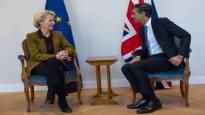British and EU representatives will meet in the so-called “last” negotiations near London. Northern Ireland’s protocol especially annoys Northern Ireland’s unionists.
British Prime Minister Rishi Sunak and President of the EU Commission Ursula von der Leyen are negotiating on Monday in Berkshire on the outskirts of London.
The so-called Northern Ireland Protocol has been fiercely negotiated for months.
If an agreement is reached, it has been promised to be announced at a press conference in the afternoon.
We gathered the answers to the most central questions of the post-Brex dispute:
What is the Northern Ireland Protocol?
The protocol is part of the agreement by which Britain left the European Union in 2021. The protocol has kept Northern Ireland, which belongs to Britain, as part of the European single market. EU legislation has been in force in Northern Ireland, although the legislation is no longer valid in the rest of Britain.
Brexit created a customs border in the Irish Sea. The island of Ireland is divided into the Republic of Ireland and Northern Ireland, and border formalities were not wanted between these regions because it was feared that it would generate violence. Armed groups of Catholic republicans frequently attacked border checkpoints during the political unrest of 1968–1998.
What is the new proposal?
Currently, goods coming from Great Britain to Northern Ireland are inspected in Northern Ireland ports. The new British proposal would have two different practices. Goods going to Northern Ireland alone would not have the same checks as goods going to Ireland, i.e. EU territory.
The EU has strict controls, for example, on milk products and eggs entering the territory of the Union.
Who wants change?
The change is especially wanted by Northern Ireland’s unionists, i.e. the Democratic Unionist Party DUP, which closely supports the British administration. The DUP has said it wants to ditch the protocol because it fears it will encourage Northern Ireland to join Ireland.
What are the problem areas?
For example, there has been uncertainty about which companies and operators could use the planned “green line”.
The EU has demanded that disputes after the entry into force of the agreement be dealt with in the European Court of Justice. Britain wants the European Court to play as little a role as possible.
The political pressure to reach an agreement is strong
Northern Ireland’s administration has been incapacitated by Brexit disputes. The DUP was supposed to form a joint government together with the pro-Irish Sinn Fein party already in May last year.
Before the negotiations, a group in the British government with a very critical view of Europe warned the prime minister not to rush into a new agreement. Group representative Mark Francois called for the abolition of all EU legislation in Northern Ireland.
Prime Minister of Ireland Leo Varadkar has expressed satisfaction that the negotiations between Sunak and von der Leyen have progressed in recent weeks.
